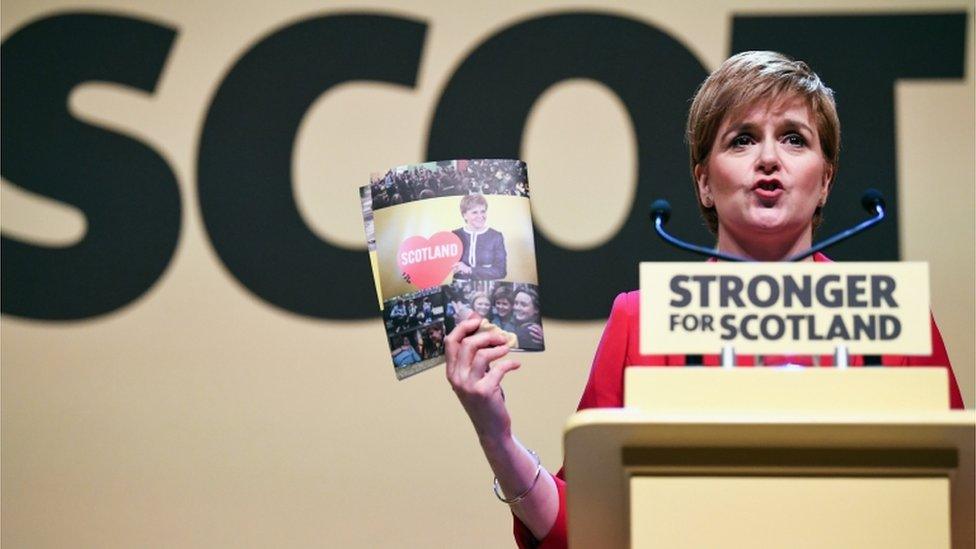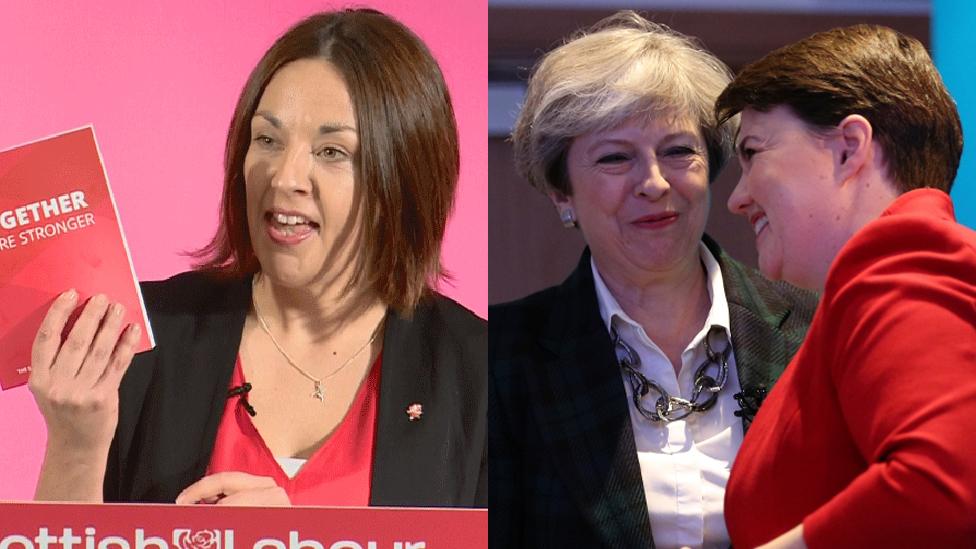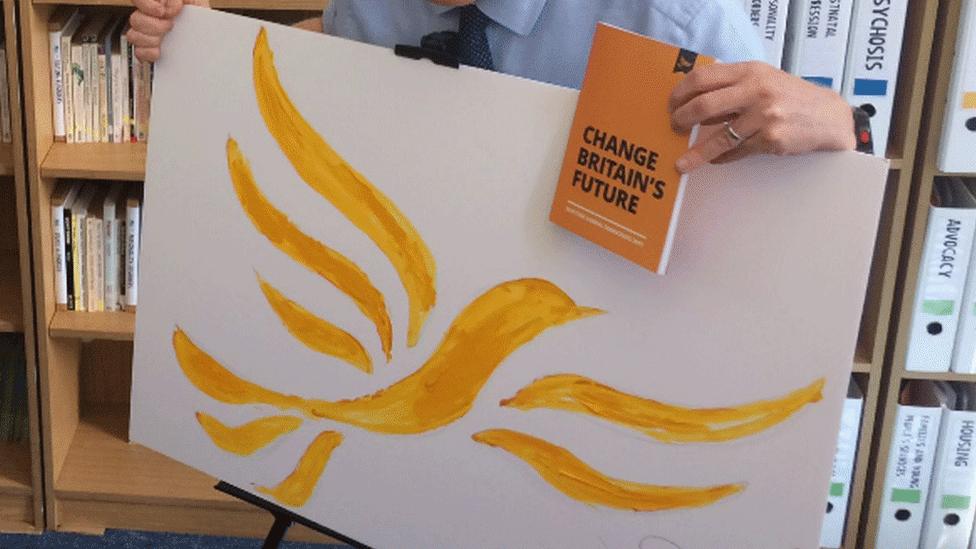Election 2017: Scottish Liberal Democrats vow to 'change country's future'
- Published
- comments
Willie Rennie launched the manifesto in Edinburgh
The Scottish Liberal Democrats have published their election manifesto, external with a vow to create an "open, tolerant and united" Scotland and UK.
The document commits the party to attempting to "change the direction of our country on independence and Brexit".
Party leader Willie Rennie said the Lib Dems would strongly oppose another "divisive" independence referendum.
But the party wants a referendum on the final terms of the Brexit deal.
The Liberal Democrats had one MP in Scotland after the 2015 election, but are hopeful of picking up more seats in the election on 8 June.
The party has proposed adding a "modest" penny on income tax in order to invest additional money in education and mental health.
The manifesto calls for new mental health services in every GP practice, A&E department, police division and school, and sets out a new five-point offer on mental health for new mothers.
It also pledges to keep the triple-lock on the state pension, and to scrap the Conservatives' two-child rule for tax credits - including the controversial "rape clause".
Among the other key proposals are:
Ending the 1% pay cap in the public sector
Exempting Police Scotland and the fire service from VAT which will give them an additional £35m to spend on services
Starting a major £100bn programme of capital spending across the UK, that will have a share spent in Scotland
The Liberal Democrats say they are now the only party campaigning for Scotland to remain in both the UK and EU single markets.
As he unveiled the manifesto, Mr Rennie said: "This is the chance to change the direction of the country and to build a brighter future.
"We can turn away from another divisive independence referendum and a damaging hard Brexit. Instead with a modest penny on tax we can invest in our people.
"This will get Scottish education back up to the best in the world again so that people have the skills to drive our economy. It will get people the mental health treatment they need so they can contribute too."

Analysis by Brian Taylor, BBC Scotland political editor
The Lib Dems they took comfort from some constituency gains in last year's Holyrood elections.
And this time around, back with a Westminster contest, they are quietly hopeful about picking up two or three seats to add to their island redoubt of Orkney and Shetland.
As with the Tories and Labour, they are targeting the SNP. The choice of target is, of course, rather delineated by the result in 2015 when the Nationalists won 56 out of 59 Scottish seats.
As with the Tories and Labour, they are targeting the SNP's core objective of independence, to be achieved via a referendum.
Spin doctors for said parties have been competing with each other to condemn indyref2 in suitably strident tones of disgust.

Mr Rennie also said his party could not work in a coalition government with Labour or the Conservatives, or support either party in an unofficial arrangement, because they both back Brexit.
And he claimed voters were switching to his party from the SNP in target seats as he accused the nationalists of hitting a "low" in personal campaigning.
He added: "I've been astonished at the rage that there is out there, including from some people who did vote for the SNP last time, and they want to stop it now.
"They are just spitting mad at the SNP at how they have banged on about independence all the time and think it's got to stop, and they are going to use this election to do so."

Nicola Sturgeon unveiled the SNP manifesto on Tuesday
When he launched the party's UK manifesto earlier this month, Lib Dem leader Tim Farron said the public had the choice to "change Britain's future".
He said that while he accepted the result of last year's EU referendum, he still believed the UK would be "better off and safer" within the EU.
Mr Rennie has claimed there is no contradiction between supporting another EU referendum while opposing one on independence, arguing that people knew what they were voting for when they rejected independence in 2014.
The Liberal Democrats are the last of Scotland's five major parties to launch their manifesto.

Labour and the Conservatives have also published their Scottish manifestos ahead of the election on 8 June
The SNP unveiled theirs on Tuesday, with Nicola Sturgeon calling for a second independence referendum to be held at the end of the Brexit process in order to prevent it being "imposed on Scotland, no matter how damaging it turns out to be".
Ms Sturgeon was campaigning in Fife on Wednesday, where she said SNP MPs would push for immediate action to "restore fairness" for people on low income.
She added that the SNP would support increases in the minimum wage to match the real living wage, an end to the public sector pay cap, and restoring fairness in the social security system.
The Conservatives and Labour are opposed to second referendums being held on either independence or Brexit.
'Not at the races'
Responding to the Lib Dem manifesto launch, Scottish Labour's James Kelly said a vote for the Mr Rennie's party would "just let the SNP back in".
He added: "In the vast majority of seats across Scotland the Lib Dems are not at the races, and every Lib Dem supporter who wants a MP who will fight both a second independence referendum and a hard Brexit must back Labour - or they will end up with a Nationalist MP once again."
The Scottish Conservatives highlighted social media posts by a current Liberal Democrat candidate who said in 2014 that she would be voting Yes in the independence referendum.
Tory candidate Kirstene Hair said: "If Willie Rennie wants to re-brand himself as the defender of the Union, he should explain why he's backing independence-supporting candidates."
- Published31 May 2017
